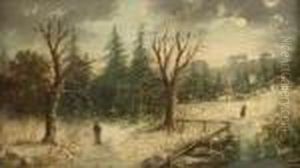Jozsef Rona Paintings
Jozsef Rona is a Hungarian sculptor born in 1944 in Budapest, Hungary. He is known for his public works and monuments, which often reflect historical themes and are installed in various locations across Hungary. Rona studied at the Hungarian University of Fine Arts, where he honed his skills in sculpture and developed his artistic voice.
During his career, Rona has participated in numerous exhibitions and his works are part of public and private collections. His style is characterized by a blend of classical techniques with contemporary themes, often exploring the human form and its expressions. He has been particularly interested in creating works that resonate with the cultural and historical context of Hungary, contributing to the country's rich artistic heritage.
One of Rona's most famous works is the equestrian statue of the 19th-century Hungarian general and national hero Arthur Gorgey, which stands in the city of Budapest. This work, like many others by Rona, demonstrates his ability to capture the strength and dynamism of historical figures, as well as his attention to detail and understanding of historical costume and symbolism.
Rona's contributions to the field of sculpture and public art have been recognized in Hungary and internationally. He has received various awards and honors for his work, and he continues to influence the next generation of artists through his teaching and mentorship. As of the knowledge cutoff date in 2023, Jozsef Rona is still active as an artist, and his works continue to be appreciated for their artistic merit and cultural significance.
